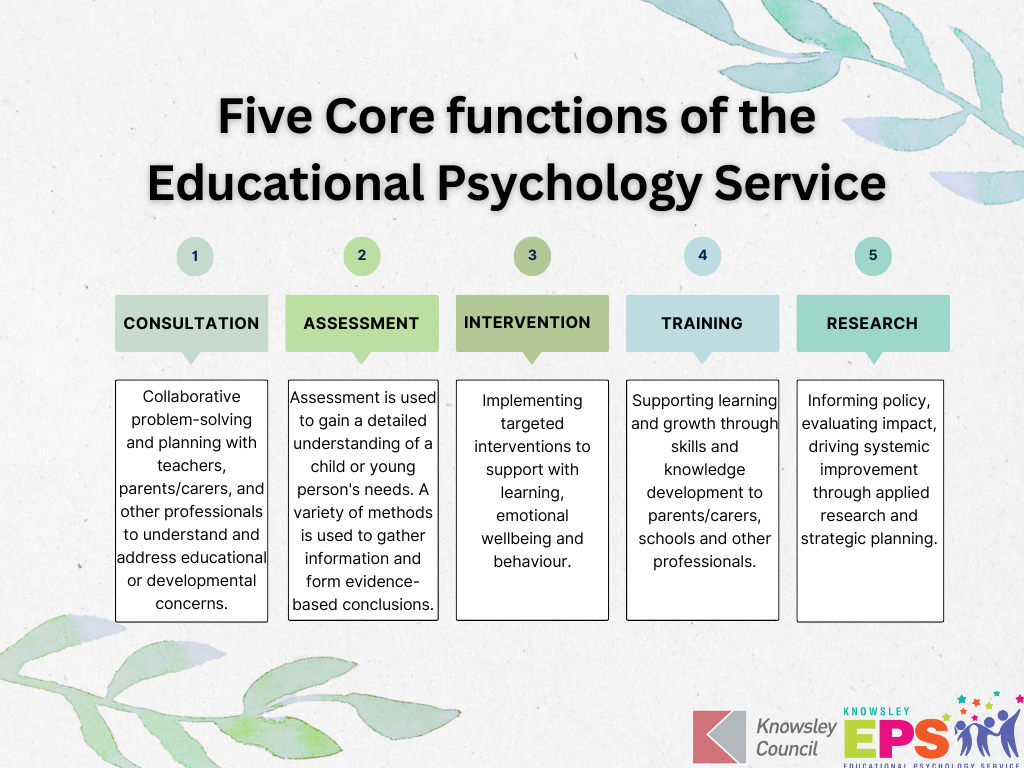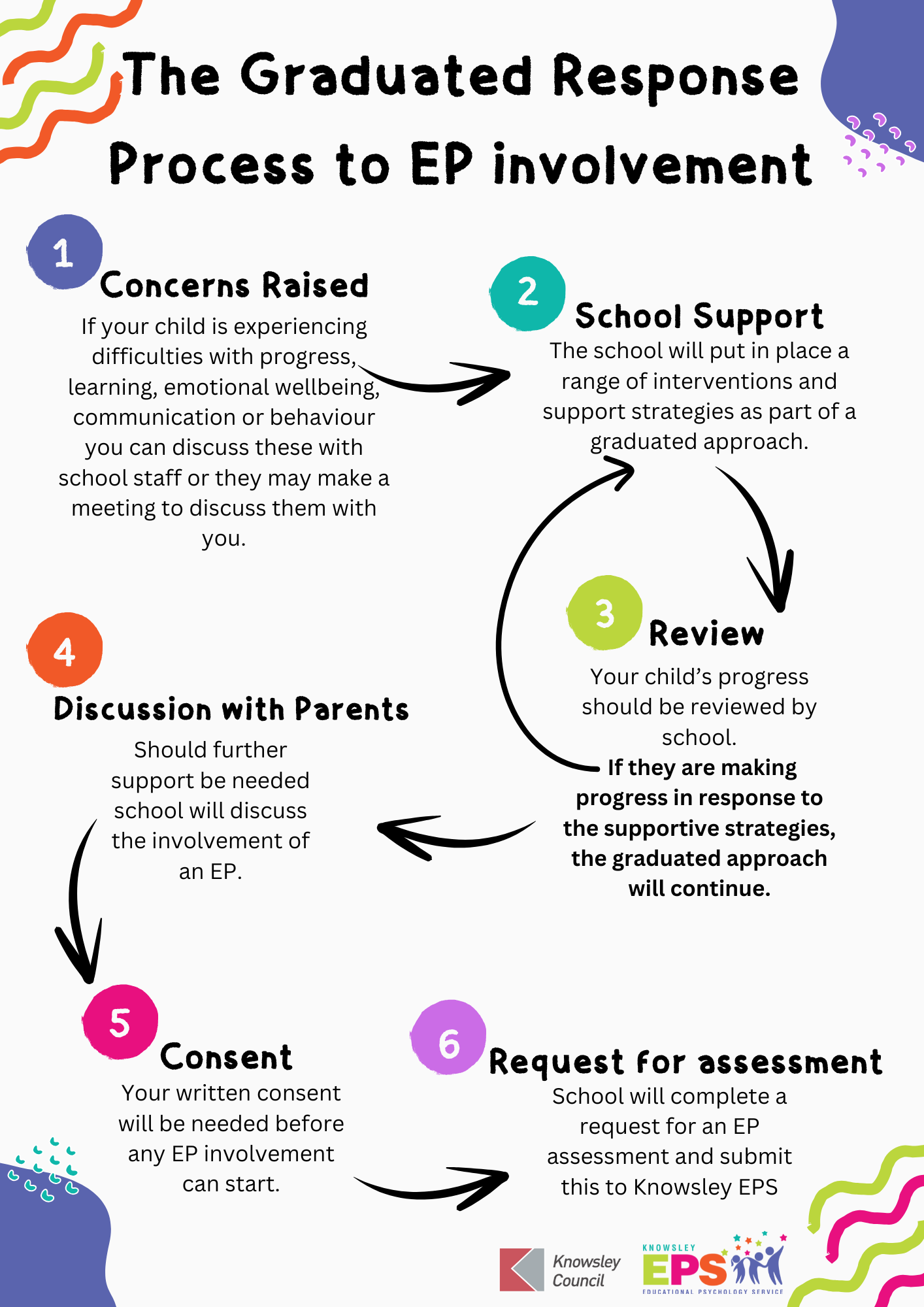About
What do Educational Psychologists Do?
In addition to providing Psychological Advice as part of the Education, Health and Care Needs Assessment process, the Educational Psychology Service is involved in many different aspects of work within the Local Authority (LA). The core function of our role comprises five key elements: consultation, assessment, intervention, training and research.

We work within the LA to develop and deliver strategies and initiatives to improve outcomes for children and young people. We also work to support other LA services through the application of psychology. Some of these services include: The Early Years Service, Youth Justice Service, Behaviour and Inclusion Service, and our Virtual School.
We also deliver nationally recognised training, such as the Emotional Literacy Support Assistant (ELSA) training and the Mediated Learning Support Approach (MeLSA). In addition, we develop bespoke training packages to support the continuous professional development (CPD) of the Knowsley workforce. These training packages are available upon request.
Who do we work with?
Knowsley Educational Psychologists (EPs) work directly with or on behalf of children and young people aged 0-25. We work collaboratively with children and young people, their parents/carers and school settings ranging from early years to post-16 providers. We also work with a range of colleagues from agencies such as Health, e.g., Children and Young People's Mental Health Services (CAMHS) and Social Care, and contribute within a range of multi-agency forums. We share our advice by either facilitating meetings or providing written feedback, e.g., consultation reports, action plans or more detailed psychological reports, depending on our level of involvement.
In Knowsley, several schools work directly with us through commissioning Service Level Agreements (SLA). These schools have a link EP who works with them at an individual (child), group or whole-school level, to carry out the core functions, as highlighted above.
If you feel your child warrants Educational Psychology involvement, please discuss this with your school's Special Educational Needs Coordinator (SENCo). The SENCo will be able to share with you what support is currently in place, and whether EP involvement is appropriate at this time, within the Graduated Approach to meeting their special educational needs.

We also work with the North West University Consortia to support the development of Trainee Educational Psychologists (TEPs). Through our role as stakeholders within the doctoral training process and the employment and supervision of TEPs on placement, we are ensuring the recruitment of future EPs to the area.
Meet the team

|
Hannah BartonPrincipal Educational Psychologist |

|
Allison InoueSenior Educational Psychologist |

|
Joanne DeanSenior Educational Psychologist |

|
Laura HaltonEducational Psychologist |

|
Fran RobertsEducational Psychologist |

|
Rachel HanrahanEducational Psychologist |

|
Elle HartEducational Psychologist |

|
Hannah FrancisEducational Psychologist |

|
Nicola WebsterEducational Psychologist |

|
Jenny ClayEducational Psychologist |

|
Michelle HarwoodEducational Psychologist |

|
Amy BiggarEducational Psychologist |

|
Jodie ReadTrainee Educational Psychologist |

|
Kezia RichardsonTrainee Educational Psychologist |

|
Catherine Braidwood HarringtonTrainee Educational Psychologist |

|
Leon RostaingTrainee Educational Psychologist |

|
Charlotte NewtonAssistant Educational Psychologist |

|
Debra FaircloughBusiness Support |

|
June ScottBusiness Support |
Recruitment
Would you like to join our team? We are a dedicated, caring and forward-thinking team who are committed to meeting the needs of children, young people and their families.
We are always looking to expand our fantastic team and have a number of roles available.
Team roles include;
- Educational Psychologists
- Trainee Educational Psychologist
- Assistant Educational Psychologists
- Associate Educational Psychologists
Educational Psychologists
Are you a qualified EP looking to be part of a dedicated and dynamic team? Come join us and be part of our future success!
Why work at Knowsley?
Knowsley Educational Psychology Service is a successful and innovative team who are passionate about making a difference to the community we serve. We are wholly invested in early intervention and the application of psychology in a proactive and positive way to make a real difference to the children and families of the borough.
As part of the team, you will have a varied and rewarding range of work, including projects and systemic development work, traded, statutory work and work in collaboration with wider Children’s Services. You will be part of a team which values professional development and supervision.
You will also be part of an award-winning council, named Local Authority of the Year in the Municipal Journal Awards 2024.
Trainee Educational Psychologists
We have a number of Trainee Educational Psychologist (TEP) placements available at Knowsley EPS. This includes year 1, 2 and 3 placements
Assistant Educational Psychologists
We also have an Assistant role at Knowsley EPS.
Our Assistant Educational Psychologists are an integral part of the team who gain exciting opportunities and experience working at Knowsley EPs. You will have the opportunity to work alongside our core team of EPs to gain an understanding of the role. You will also be able to work in partnership within the wider Children’s Services, including Early Years’ Service, Virtual School, and SEND Service.
Qualifications and experience required to be an Assistant Educational Psychologist;
- A BPS-accredited degree in Psychology
- Experience working with children and young people
Associate Educational Psychologists
We also work closely with a team of Associate Educational Psychologists who are qualified EPs registered with HCPC. They support our statutory work to support effective and timely assessment as part of the EHC Needs Assessment processes.
If you are interested in joining us as an Associate EP please contact Dr Hannah Barton (Principal Educational Psychologist) via email at EPS@knowsley.gov.uk.

